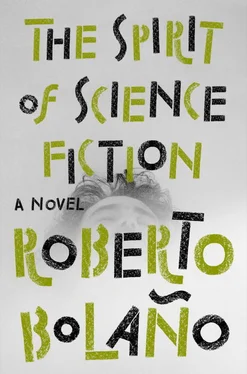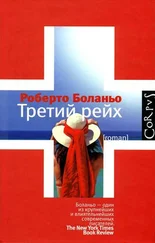It was a clear night, and the moon in Dr. Carvajal’s neighborhood looked like a sheet hung out to dry in the windy sky. The motorcycle had broken down, as usual, and we pushed it along, trading places every two blocks.
“Explain what you mean, please, because I have no clue either.”
“I feel like killing somebody.”
After a long time, he added, “I feel like getting a tattoo on my arm.”
Now I was the one pushing the motorcycle.
“What kind of tattoo?”
“The hammer and sickle.” His voice sounded dreamy and carefree. Good, I thought: it was just the night for dreams, and we had a long walk ahead of us. I laughed.
“No, man, how about this: I’LL LIVE IN MEMORY FOREVER. Don’t you like that?”
“Fuck, it’s weird, leaving that asshole’s house I was super depressed but also super happy.”
I said I didn’t understand, and we were silent until it was his turn to take the motorcycle.
“Make that tattoo a Mexican flag with the hammer and sickle on it,” he said.
I lit a cigarette. It was nice to walk without having to push the motorcycle. We were in a neighborhood of narrow streets, stunted trees, and three-story buildings.
“I’d like to get the fuck out of here once and for all,” said José Arco. “With the motorcycle and my Mexican flag.”
“Tell me what you didn’t like about Dr. Carvajal.”
“His skull face.” He spoke each word with blind conviction. “He looked like a Posada skeleton taking the pulse of all the poor young poets.”
“Yes,” I said, “now that you mention it…”
“Fuck, he was the skeleton of Posada, dancing while he took the pulse of the whole country.”
Suddenly I felt that there was an edge of truth to José Arco’s words. I tried to piece together Dr. Carvajal’s face, the living room of his apartment, the ordinary things in it, the way he greeted us and got up to look for the magazines, his eyes that might have been scrutinizing something else, somewhere else, as we were talking.
“I realized it when you were telling us all about the Yankee games. He didn’t realize that I realized it.”
“Realized what?”
“The way he was looking at us, looking at you, like everything you were saying was old news to him… For a second, I thought it was true, the old bastard knew everything…”
Without being aware of it, we had stopped walking. There was a change in the sky all of a sudden: somewhere in Mexico City, it was raining, and to judge by the thunder and lightning, we would soon be getting drenched. My friend smiled. He was perched on the seat of the motorcycle, and he seemed to be waiting for the downpour.
“Just thinking about it scares me,” I said.
“It’s not such a big deal. Looks like it’s going to rain.”
“He did have a skull face, you’re right,” I said.
“Yeah, afterward I thought it wasn’t that he knew everything but that nothing mattered to him.”
“Maybe, maybe not.”
“There are lots of guys like that. They call themselves ‘sons of the Mexican Revolution.’ They’re interesting, but they’re actually fucking sons of bitches, not sons of the revolution.”
“Maybe, maybe not,” I said as I looked up at the dark, dark, pitch-black sky. “We’re going to get caught in the storm.”
“I don’t hate them. In fact, it’s amazing to see how they deal with loneliness.” José Arco held out his hands with the palms upraised. “In a very, very twisted way, they’ve gotten what they wanted: they’re the absentee fathers of this country. A drop just fell on me.” He raised the palm of his hand to his nose and sniffed it as if rain had more than one smell (it does).
“I don’t know what to tell you…. This fucking piece-of-shit bike, we’re going to get soaked…”
“I couldn’t.”
“You couldn’t what?” The raindrops began to patter on the dark body of a fifties Ford parked in front of us. We hadn’t noticed it until now; it was the only car on the empty street.
“I could never be so alone, so silent, so disciplined about myself and my fate, pardon the expression.”
“Fuck…”
A broad, bright smile appeared on José Arco’s face.
“Come on, my friend’s garage is around here. Let’s see if he’ll fix the bike and give us coffee.”
Dear James Tiptree Jr.:
The rain teaches us things. It’s night and it’s raining: the city spins like a shiny top, but some areas are opaque, emptier; they’re like flickering dots; the city spins happy in the middle of the deluge, and the dots throb. From where I am, they seem to swell like a feverish temple or like black lungs with no notion of the shine that the rain is trying to give them. Sometimes I have the impression that the dots manage to touch: it’s raining, there’s lightning, and an opaque circle brushes another opaque circle, making a supreme effort. But that’s as far as it goes. Immediately they shrink into their own spaces and keep throbbing. Maybe brushing each other is enough; it’s possible that the message, whatever it is, has been sent. And so on, for hours or minutes, as long as the rain lasts. This, I think, is a happy night. I read, I wrote, I studied, I ate cookies and drank tea. Then I went out on the roof to stretch my legs, and when it got dark and it started to rain, I climbed up to the roof of the roof (in other words, the roof of my room) with an umbrella and binoculars, and I was there for almost three hours. It was then that I thought of you—I can’t remember why now—and of the letter that I sent you quite a while ago. (I don’t know whether you received it; to be safe, I’m sending this one to the Spiderman brothers’ agency.) About that first letter… well, I just want to say that I sincerely hope you didn’t take it the wrong way or you weren’t offended that I addressed it to Alice Sheldon. I swear it wasn’t a breach of trust. It’s just that unlike many of your current readers, I already knew your earlier work, back when everybody said that James Tiptree Jr. was a retiree who had come late to writing. And I liked it. Later, of course, I was surprised when I found out that the name was actually a pseudonym—and according to some accounts more than a pseudonym, a heteronym—for the psychologist Alice Sheldon. A simple superimposition of images, you see. And Alice Sheldon happens to be a much prettier, warmer name. That’s all. (Sometimes I imagine the retired Mr. Tiptree writing in a little house in Arizona. Why Arizona? I don’t know. I must have read it somewhere. Maybe it was Fredric Brown, who lived in Arizona for a few years, more or less as a retiree, in all the exile and equilibrium that the word implies. For argument’s sake, wouldn’t it be better to maintain a correspondence with North American retirees than with science fiction writers? Could I convince them to send letters to the White House demanding an end to the policy of aggression toward Latin America? It’s certainly possible, but let’s not get ahead of ourselves.) The rain isn’t stopping. While I was perched on the roof gazing through my binoculars at the dark rooftops of other buildings, a question came into my mind: how many science fiction novels have been written in Paraguay? On the surface, it seems like a stupid question, but it made so much sense to me just then that it kept coming back to me, like a catchy pop song. Were the closed windows of Mexico City really Paraguay? Were the storm and the rooftops that I was watching through the binoculars really the science fiction of Paraguay? (For half a mile all around, there were lights in very few windows, maybe something like ten or fifteen of them, and almost all on a strip of Insurgentes Sur; none of the lights were on rooftops.) At the time, the question struck me as terrifying. Now not so much. But now I’m sitting in my room, not outside in the rain. I don’t know. I’ll send you a postcard of Mexico City with this letter. It’s a photograph, a shot taken from the Torre Latinoamericana. You can see the whole city. It’s daytime, around two in the afternoon, but the print or the photograph itself is slightly flawed: the image is fuzzy. It’s what I felt tonight, in the dark. I’ll keep you posted.
Читать дальше












